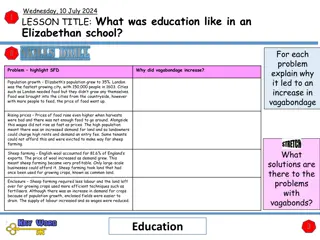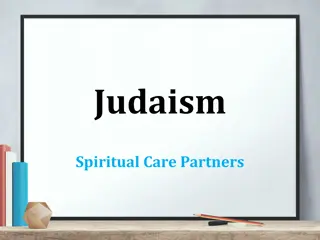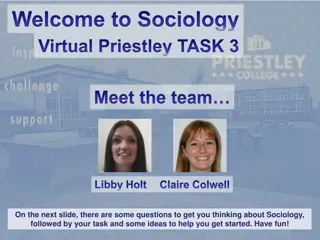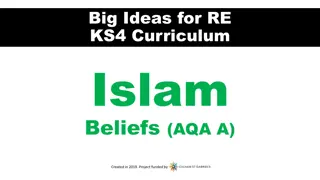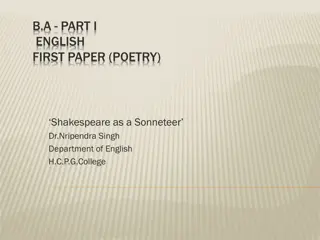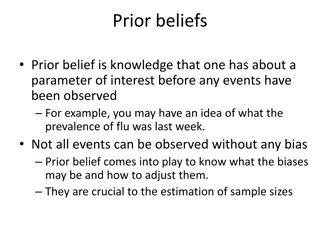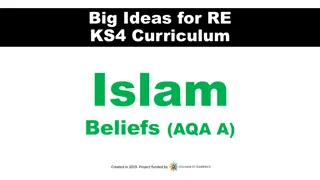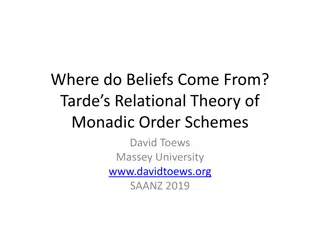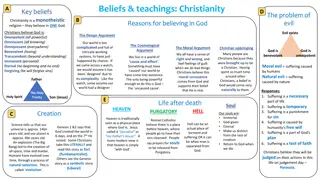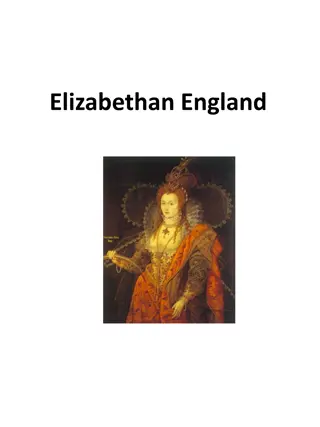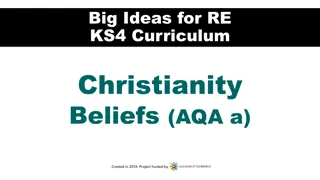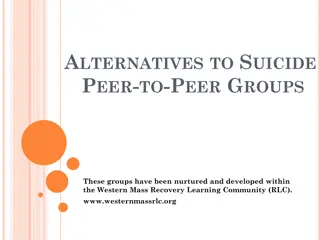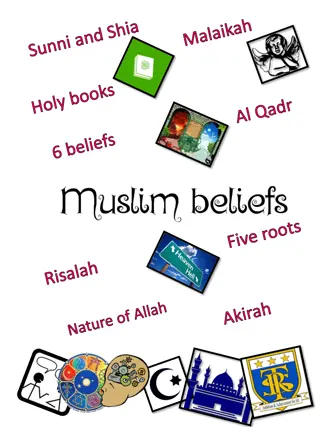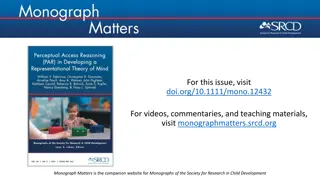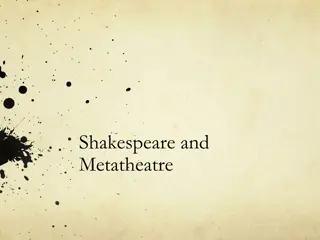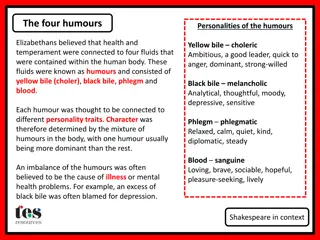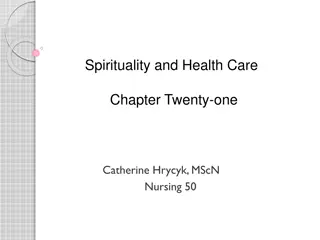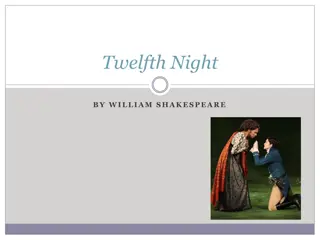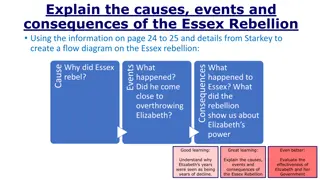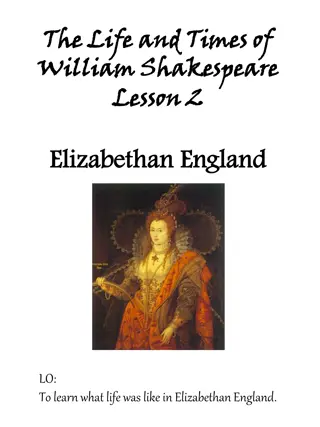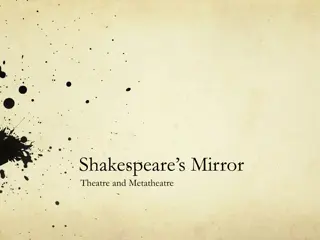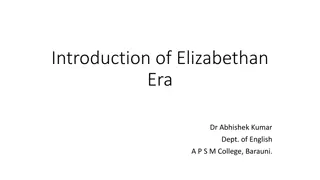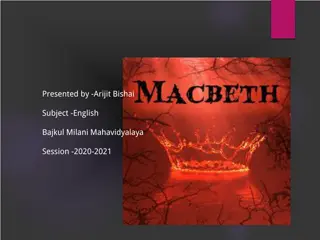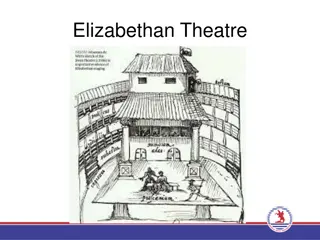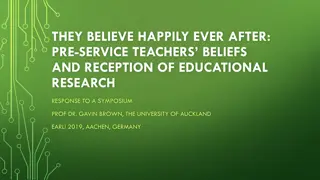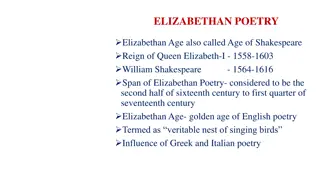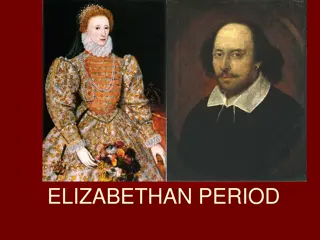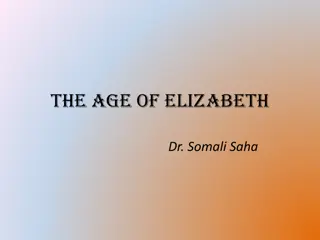Education in Elizabethan England: Understanding the Impact on Vagabondage
Explore the educational landscape of Elizabethan England and its effects on societal issues like vagabondage. The content delves into the challenges faced in schools, the reasons behind the increase in vagabondage, and potential solutions to address these issues.
1 views • 7 slides
Symbols and Beliefs of the Salvation Army: A Visual Guide
Explore the core beliefs and symbolic representations of the Salvation Army through images and explanations. From the significance of the cross to the meaning behind the sword and shield symbols, discover how members of the Salvation Army express their faith and mission through various visual elemen
0 views • 17 slides
Symbols and Facts: Uncovering Shakespeare and Elizabethan Theatre
The analysis begins by exploring the symbols present on the cover of "Romeo and Juliet" such as the sword and roses. It then delves into distinguishing facts from opinions regarding Shakespeare's life, touching on key events like his baptism, marriage, and career. Additionally, it provides insights
0 views • 26 slides
Understanding Jewish Spiritual Care: Beliefs and Practices
Judaism's spiritual care is rooted in core beliefs such as the existence of God, the Torah, and key tenets of faith. Important aspects include the Jewish calendar, the role of the rabbi in religious guidance and pastoral counseling, and diverse views on the afterlife. Providing spiritual care to Jew
1 views • 12 slides
Understanding Values, Beliefs, and Personal Values in Everyday Life
Our values and beliefs shape how we think, act, and make decisions in everyday life. Whether conscious or not, they influence our behavior and attitudes. This article explores the definitions and importance of beliefs, values, and personal values, highlighting how they impact individual decision-mak
0 views • 27 slides
Understanding the Shirbit Culture: Beliefs and Rituals
The Shirbit culture holds unique beliefs about the human body, engaging in elaborate rituals to counter its perceived weaknesses and maintain social well-being. This culture's practices include secretive ceremonies, reverence for a charm box, and self-mutilation rituals for both men and women, all b
1 views • 9 slides
Elizabethan Religious Settlement: Unity Amidst Division
Amid religious division in England, Queen Elizabeth I implemented a Religious Settlement in 1559 to unify the country. The settlement, a blend of Protestant and Catholic elements, aimed to maintain peace and prevent rebellions. Elizabeth's strategic compromise pleased most people, though lingering t
0 views • 14 slides
Cultivating Beliefs: The Garden of Our Minds
In the garden of our minds, our beliefs are the seeds we plant and nurture. Just as we each have our unique soil, we develop beliefs about ourselves, others, and the world. We make decisions based on the strokes we receive from our environment, shaping our script. Reflect on the positive and negativ
0 views • 20 slides
Exploring Islam Beliefs in the KS4 Curriculum: Big Ideas and Key Concepts
Delve into the fundamental beliefs of Islam according to the AQA A curriculum, focusing on the authority of Prophethood, key beliefs like Tawhid (Oneness of God), nature of God, angels, predestination, and the afterlife. Explore the significance of holy books like the Qur'an, Torah, Psalms, and Gosp
0 views • 10 slides
Shakespeare's Sonnets: Treasures of Elizabethan Poetry
Shakespeare's sonnets, considered precious pearls of Elizabethan poetry, were written primarily in 1594 under the patronage of the Earl of Southampton. Divided into sections addressing a young man and a Dark Lady, they explore themes of love, beauty, and passion with a unique perspective. Despite be
0 views • 8 slides
Understanding Prior Beliefs and Eliciting Expert Opinions in Parameter Estimation
Prior beliefs play a crucial role in estimating parameters of interest before observing events. They can be elicited from sources like meta-analyses, literature, and expert opinions. Experts' beliefs are often measured using Beta or Normal distributions for different outcomes. Eliciting prior belief
0 views • 22 slides
Exploration of Islamic Beliefs in the RE KS4 Curriculum
This educational project delves into key concepts of Islam, focusing on beliefs about God as found in the Quran. Through interactive lessons and activities, students explore the significance of Eid ul-Adha, Ibrahim's submission to God, and the roots of Islamic monotheism. The curriculum aims to deep
0 views • 10 slides
The Origins of Beliefs: A Comparative Analysis of Tarde and Durkheim
Gabriel Tarde and Emile Durkheim engaged in philosophical debates on the origins of beliefs within societal structures. While Durkheim saw beliefs as integral to society's moral ideals, Tarde proposed a neo-monadological theory focusing on actors' beliefs within social practices. The discourse quest
2 views • 19 slides
Christianity: Key Beliefs, Teachings, and Jesus' Sacrifice
Christianity is a monotheistic religion centered on beliefs in God's omnipotence, benevolence, and the existence of evil. Christians attribute their moral conscience and sense of right and wrong to God. The faith also incorporates teachings about Jesus' suffering and crucifixion, emphasizing forgive
3 views • 9 slides
Life in Elizabethan England: A Glimpse into Stratford
Explore the vibrant streets of Elizabethan towns like Stratford, where markets thrived and malting was a prominent industry. Discover the grid pattern of streets, the devastating fires, and the Bard Tavern's menu offering a taste of the era's culinary delights. Learn about the town's governance by t
0 views • 18 slides
Exploring Christianity: Beliefs and Key Concepts at KS4
This project delves into the foundational beliefs of Christianity, focusing on key concepts such as the nature of God, the Trinity, Jesus Christ, salvation, the afterlife, and the problem of evil. The curriculum covers diverse interpretations within Christianity, ethical dimensions, philosophical in
0 views • 4 slides
Comedy Techniques, Social Function, and The Great Chain of Being
Explore the world of comedy, from slapstick and farce to parody and satire. Learn about techniques like dramatic irony and gallows humor that add depth to comedic genres. Discover how the Great Chain of Being shaped Elizabethan beliefs about social order and divine right. From God and angels to tree
0 views • 6 slides
Understanding Suicide Beliefs and Peer-to-Peer Support Groups
Explore beliefs about suicide and the impact on open discussions. Learn about Alternatives to Suicide peer-to-peer groups and the values and framework they uphold for mutual support. Emphasizing empathy, respect, and non-coercive approaches, these groups provide a safe space for individuals to share
3 views • 20 slides
Comparison of Beliefs in Sunni and Shia Islam regarding Allah, Prophets, and the Last Day
Sunni and Shia Islam have core beliefs focusing on Allah, prophethood, and the afterlife. While Sunni Muslims emphasize Tawhid and the last day judgment, Shia Muslims also emphasize the belief in the Imams as successors of Prophet Muhammad. Both sects share common beliefs in Allah's attributes and t
4 views • 12 slides
Exploring Socio-Cultural Beliefs Impact on Community Health Insurance in Nigeria
In Nigeria, the demand for Community Based Social Health Insurance Programs (CBSHIP) is influenced by socio-cultural beliefs. This case study conducted in Ondo Residents delves into the challenges and opportunities faced in ensuring universal health coverage, particularly in rural areas. By examinin
0 views • 13 slides
Understanding Theory of Mind Development in Children
Explore the role of Perceptual Access Reasoning (PAR) in theory of mind development through topics like false-belief tasks, reasoning about desires and beliefs, and understanding false beliefs in young children. Learn how children perceive unseen mental states and predict behaviors based on beliefs
0 views • 27 slides
Shakespeare and Metatheatre: Exploring Elizabethan Theatre Anxiety
Explore the Elizabethan anxiety surrounding the theatre during Shakespeare's time, as highlighted by Philip Stubbes and Sir Philip Sidney. The text delves into concerns about the immoral influence of plays and interludes, portraying a vivid picture of the societal apprehensions towards theater and i
0 views • 38 slides
Beliefs and Influences in Elizabethan Era
Elizabethans believed in the connection between health, temperament, and the four humours - yellow bile, black bile, phlegm, and blood - each associated with specific personality traits. They also linked star signs to body parts and embraced the divine order of the chain of being, respecting the hie
0 views • 6 slides
Understanding Spirituality and Health Care in Nursing Practice
Exploring the concepts of spirituality, religious versus secular perspectives, spiritual distress, and the role of nurses in providing spiritual support during times of transition and vulnerability. Spirituality is defined as a sense of meaning in life and inner spirit, central to creating beliefs a
0 views • 11 slides
Insights into Shakespeare's "Twelfth Night
Explore the origins of Shakespeare's "Twelfth Night" and its characters in Elizabethan comedy. Delve into the historical context of the play, Shakespeare's life, and the universal appeal of his works in Elizabethan England.
0 views • 16 slides
Understanding the Essex Rebellion and Elizabethan Decline
Explore the causes, events, and consequences of the Essex Rebellion and evaluate its impact on Elizabeth and her government, shedding light on why the final years of Elizabeth's reign were viewed as a period of decline. Delve into societal changes, living standards, and cultural advancements during
0 views • 20 slides
Understanding Political Beliefs and Behaviors: A Comprehensive Overview
Explore the formation, evolution, and transmission of political beliefs, as well as the impact of differing beliefs and behaviors on the political process. Delve into platform issues, political affiliations, and their influences to gain a deeper understanding of the political landscape.
1 views • 53 slides
Understanding the Power of Beliefs and Thoughts
Explore the profound impact of beliefs and thoughts on our internal world, behaviors, and emotions. Uncover how our inner dialogue shapes our perception and influences our beliefs about ourselves, others, and life. Delve into the significance of renewing the mind to foster a healthier belief system
0 views • 94 slides
Ghost Beliefs and Perceptions Survey Analysis
A survey conducted on ghost beliefs and perceptions explored various aspects such as gender, college majors, region, religiosity, ghostly encounters, belief in supernatural entities, enjoyment of ghost-themed shows, and the willingness to seek out ghosts. The analysis revealed diverse perspectives a
1 views • 15 slides
Insights into Elizabethan Beliefs in Shakespeare's "Hamlet
Act 1, Scene 1 of "Hamlet" introduces characters and Elizabethan beliefs like ghostly encounters, the power of Latin to exorcise spirits, and the constraints of ghosts. Horatio's skepticism evolves, validating ghostly apparitions for the audience. The scene contrasts superstitions, hierarchy, and ed
0 views • 8 slides
Life in Elizabethan England: Insights from Stratford Upon Avon
Discover the bustling streets of Elizabethan towns like Stratford, market days, and significant events like fires and civic regulations. Explore the daily life and challenges faced by the residents during this historical era.
0 views • 5 slides
Elizabethan Theatre Concerns and Metatheatre Reflections
The Elizabethan era was marked by concerns about the moral influence of theatres. This period saw the establishment of new buildings like The Theatre and The Curtain. Philip Stubbes criticized the theatregoers' behavior, highlighting perceived vices portrayed in plays. Similarly, Sir Philip Sidney d
0 views • 40 slides
Insight into the Elizabethan Era: Queen Elizabeth's Reign
The Elizabethan Era under Queen Elizabeth's reign marked a transformative period in England, characterized by a shift from darkness to light in various aspects of English life. Queen Elizabeth's dedication to England and her inspiring patriotism brought about unity and national greatness, amidst rel
0 views • 9 slides
The Concept of Fate and Free Will in Elizabethan Worldview
The Elizabethan worldview, shaped by the Great Chain of Being, believed in a predetermined order where everything had a fixed place. This belief in divine hierarchy influenced societal structure and interactions, emphasizing responsibilities and consequences. The idea of disrupting this order leadin
0 views • 31 slides
Exploring the Intriguing Themes of Shakespeare's Macbeth
Delve into the captivating world of Shakespeare's Macbeth, where themes of power, betrayal, and darkness unfold against a backdrop of historical context. Uncover how the play intertwines with the reign of King James I and reflects the political turmoil and beliefs of the Elizabethan era. From the po
0 views • 12 slides
Insights into Elizabethan Tragedy and Classical Influence in Drama
Explore the world of Elizabethan theatre, the influence of classic Latin drama, and the evolution of tragedy from the 16th century to modern times. Learn about the elements of tragedy, the shift in tragic heroes from kings to middle-class individuals, and key concepts like hamartia, nemesis, and cat
0 views • 7 slides
Pre-Service Teachers' Beliefs and Reception of Educational Research
Exploring the awareness and trust of pre-service teachers in educational psychology misconceptions, epistemic trust in educational scientists, questioning prior beliefs when faced with evidence, and beliefs about the instrumental quality of information sources for teaching. The symposium delves into
0 views • 10 slides
Insights into Elizabethan Poetry: A Glance at the Golden Age
The Elizabethan Age, also known as the Age of Shakespeare, during Queen Elizabeth I's reign from 1558 to 1603, marked a golden era in English poetry. This period saw a flourishing of poetic forms influenced by Greek and Italian poetry. Major poets like Edmund Spenser, Sir Philip Sidney, and William
0 views • 6 slides
The Flourishing Elizabethan Period in English Literature
The Elizabethan period, characterized by the reign of Queen Elizabeth I, was a time of significant cultural and literary growth in England. This era saw a robust development of drama and lyric poetry, with notable figures like William Shakespeare making their mark. Amidst political turbulence and re
0 views • 20 slides
The Literary Legacy of Elizabethan Era: Poetry, Drama, and Shakespearean Masterpieces
The Elizabethan Age marked a rich literary period with the emergence of new classicism and romanticism. Notable poets like Spenser, Donne, and Wyatt, along with pre-Shakespearean dramatists, paved the way for the renowned works of William Shakespeare. His poems and plays, ranging from comedies to tr
0 views • 11 slides
